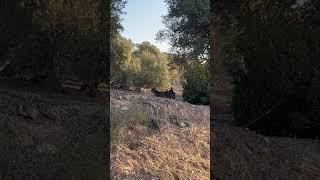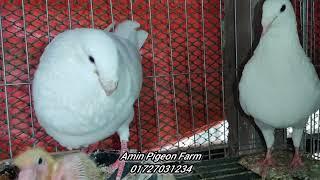https://www.anythinggermanshepherd.com/long-haired-vs-short-haired-german-shepherds-fast-facts-for-prospective-pet-owners/
Newsletter signup: https://anythinggermanshepherd.ck.page/adopting-a-dog
Most of us are familiar with the short-haired German shepherd, as this is the breed most commonly seen on TV.
Long haired German shepherds are rarer, and because their fur is considered a defect by the AKC, they’re not recognized as an official breed.
The good news is that if you aren't looking for a show dog, a long-haired German shepherd can make a wonderful pet.
Long haired German shepherds are the product of autosomal recessive genes, which is considered a "fault" by the AKC, but many GSD enthusiasts prize the long haired German shepherd for their beautiful, silky coats.
The positive traits people associate with the classic short-haired German shepherd are just as prevalent in their long-haired counterparts, which includes intelligence and loyalty.
On average, you can expect a long- or short-haired German shepherd to live 10 - 13 years, and please remember that a proper diet, frequent exercise, and regular veterinary visits can all help extend your GSD’s life.
The cost of your GSD will depend on a number of variables including the reputability of your breeder and whether you choose a short haired or long haired German shepherd.
Since the long haired GSD isn’t AKC recognized, they usually cost less than a purebred short-haired GSD.
Short-haired German Shepherds will cost more if they’re purebreds and come from reputable breeders, generally ranging anywhere from $500 to $1500 per puppy.
The German Shepherd is commonly thought to be among the most intelligent dogs in the world since, among other things, they’re incredibly easy to train when done properly.
They’ll also reciprocate the love and affection shown to them, and both long- and short-haired GSDs will be devoted protectors to their owners.
German shepherds are sometimes said to have "one-track minds," and this helps explain their utility as working dogs.
Though strong and hearty animals, German shepherds do have a predisposition to a few particular ailments that can affect their quality of life.
One of the most common is hip dysplasia, a malformation of the hip socket that can lead to arthritis and potential lameness.
When choosing between a long haired and short-haired German Shepherd, you may wonder if shedding differs at all between the two.
Though it may seem logical to assume that long haired German Shepherds shed more hair, the reality is that both breeds are equally guilty of serious shedding!
The main difference between the two breeds is that while a short-haired German shepherd tends to drop loose hair easily, the long-haired breed will carry a lot of shedded hair in its coat.
Especially in the spring and winter when animals naturally lose their hair, you can expect your long-haired Shepherd’s undercoat to thin out, and the shedded fibers remain trapped in its outer coat.
Although you can't completely stop shedding, there are steps you can take to help reduce the mess.
Ideally, your GSD should be brushed every day. If you get rid of the loose hair before it drops from the dog’s body, you'll be able to lower the impact on your carpet and furniture.
Regular baths can also help reduce shedding, especially for long-haired breeds. Thorough grooming can help remove the stubborn undercoat that doesn't always want to come free with brushing alone, and it'll keep your GSD smelling fresh!
You should also try to give your short- or long-haired German Shepherd something to do to help keep its mind occupied, and to help it burn off energy.
Regular exercise should be a consistent part of your dog's daily routine, which can include walking, playing at the dog park, or even agility training. If your German shepherd is primarily an indoor dog, you can also try puzzle toys to keep their minds active.
Newsletter signup: https://anythinggermanshepherd.ck.page/adopting-a-dog
Most of us are familiar with the short-haired German shepherd, as this is the breed most commonly seen on TV.
Long haired German shepherds are rarer, and because their fur is considered a defect by the AKC, they’re not recognized as an official breed.
The good news is that if you aren't looking for a show dog, a long-haired German shepherd can make a wonderful pet.
Long haired German shepherds are the product of autosomal recessive genes, which is considered a "fault" by the AKC, but many GSD enthusiasts prize the long haired German shepherd for their beautiful, silky coats.
The positive traits people associate with the classic short-haired German shepherd are just as prevalent in their long-haired counterparts, which includes intelligence and loyalty.
On average, you can expect a long- or short-haired German shepherd to live 10 - 13 years, and please remember that a proper diet, frequent exercise, and regular veterinary visits can all help extend your GSD’s life.
The cost of your GSD will depend on a number of variables including the reputability of your breeder and whether you choose a short haired or long haired German shepherd.
Since the long haired GSD isn’t AKC recognized, they usually cost less than a purebred short-haired GSD.
Short-haired German Shepherds will cost more if they’re purebreds and come from reputable breeders, generally ranging anywhere from $500 to $1500 per puppy.
The German Shepherd is commonly thought to be among the most intelligent dogs in the world since, among other things, they’re incredibly easy to train when done properly.
They’ll also reciprocate the love and affection shown to them, and both long- and short-haired GSDs will be devoted protectors to their owners.
German shepherds are sometimes said to have "one-track minds," and this helps explain their utility as working dogs.
Though strong and hearty animals, German shepherds do have a predisposition to a few particular ailments that can affect their quality of life.
One of the most common is hip dysplasia, a malformation of the hip socket that can lead to arthritis and potential lameness.
When choosing between a long haired and short-haired German Shepherd, you may wonder if shedding differs at all between the two.
Though it may seem logical to assume that long haired German Shepherds shed more hair, the reality is that both breeds are equally guilty of serious shedding!
The main difference between the two breeds is that while a short-haired German shepherd tends to drop loose hair easily, the long-haired breed will carry a lot of shedded hair in its coat.
Especially in the spring and winter when animals naturally lose their hair, you can expect your long-haired Shepherd’s undercoat to thin out, and the shedded fibers remain trapped in its outer coat.
Although you can't completely stop shedding, there are steps you can take to help reduce the mess.
Ideally, your GSD should be brushed every day. If you get rid of the loose hair before it drops from the dog’s body, you'll be able to lower the impact on your carpet and furniture.
Regular baths can also help reduce shedding, especially for long-haired breeds. Thorough grooming can help remove the stubborn undercoat that doesn't always want to come free with brushing alone, and it'll keep your GSD smelling fresh!
You should also try to give your short- or long-haired German Shepherd something to do to help keep its mind occupied, and to help it burn off energy.
Regular exercise should be a consistent part of your dog's daily routine, which can include walking, playing at the dog park, or even agility training. If your German shepherd is primarily an indoor dog, you can also try puzzle toys to keep their minds active.















Commentaires